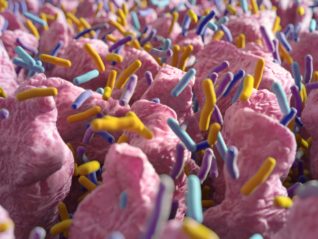
by Lewis Chang, PhD and Noelle Patno, PhD
New research continues to demonstrate that the benefits of probiotics are strain-specific,1 and their effects go beyond supporting digestive health. A recent example is the strain Bifidobacterium animalis ssp. lactis 420 (B420), which was previously shown in a 6-month randomized clinical trial to support weight management in adults affected by overweight or obesity.2 Recently, new data analysis from that study found other potentially beneficial metabolic benefits associated with B420.3
The original trial randomized 225 healthy adults (BMI 28-34.9; waist-to-hip ratio of ≥ 0.83 for women and ≥ 0.88 for men) into 4 groups: placebo (12 g/day), polydextrose fiber (12 g/day), B420 (10 billion CFU/day), and polydextrose fiber + B420 (12 g + 10 billion CFU/day) for 6 months, with no other dietary changes nor caloric restriction.2 Compared with placebo, B420 interventions resulted in a 4.0% reduction in body fat mass and a 2.4% reduction in waist circumference, as well as a reduced energy intake by roughly 300 kcal/day.2
The new analysis in the journal Beneficial Microbes aimed to investigate whether there was a link between the observed benefits and changes in the gut microbiota from a subset (n=134) of participants who were compliant with the study protocol and had provided fecal samples for microbiota composition analysis.3
The study investigators found that, compared with placebo, consumption of B420 (with or without fiber) for 6 months resulted in alterations of the gut microbiota. Specifically, there was a greater abundance of the bacterial species Akkermansia muciniphila (A. muciniphila) at the end of the 6 months of supplementation.3 Lower levels of A. muciniphila have been observed in individuals with obesity, type 2 diabetes, metabolic and cardiovascular diseases, and low-grade inflammation.4 Further, individuals with a higher abundance of A. muciniphila have been shown to exhibit healthier signs of metabolism, including glucose and triglyceride homeostasis, and body fat distribution.5
Clinical strategies to increase A. muciniphila are lacking.6 The clinical study using B420 also showed that total fecal short-chain fatty acid (SCFA) concentrations increased after B420 supplementation,2 supporting the hypothesis that SCFA promoted the growth of A. muciniphila because it was increased (SCFA increases the growth of mucins, which A. muciniphila degrades).6 Since a recent review of the literature,6 this current publication is the first human clinical study to demonstrate that a particular probiotic strain, specifically B420, increased A. muciniphila in humans.
Although the underlying mechanisms by which B420 (with or without fiber) affects body weight management and body composition regulation are not fully understood, the study investigators believe that B420’s modulating effect on the gut microbiota of the host may contribute to the observed clinical benefits.
Why is this Clinically Relevant?
- The probiotic strain animalis ssp. lactis 420 increased the abundance of A. muciniphila, which is associated with healthy, lean body composition and improved metabolism
- This study illustrates that consumption of the particular probiotic strain B420 has a novel role in modifying the microbiome in addition to supporting weight management
Citations
- McFarland LV, Evans CT, Goldstein EJC. Strain-specificity and disease-specificity of probiotic efficacy: a systematic review and meta-analysis. Front Med (Lausanne). 2018;5:124.
- Stenman LK, Lehtinen MJ, Meland N, et al. Probiotic with or without fiber controls body fat mass, associated with serum zonulin, in overweight and obese adults–randomized controlled trial. EBioMedicine. 2016;13:190-200.
- Hibberd AA, Yde CC, Ziegler ML, et al. Probiotic or synbiotic alters the gut microbiota and metabolism in a randomised controlled trial of weight management in overweight adults. Benef Microbes. 2019;10(2):121-135.
- Cani PD, de Vos WM. Next-generation beneficial microbes: the case of Akkermansia muciniphila. Front Microbiol. 2017;8:1765.
- Dao MC, Everard A, Aron-Wisnewsky J, et al. Akkermansia muciniphila and improved metabolic health during a dietary intervention in obesity: relationship with gut microbiome richness and ecology. Gut. 2016;65(3):426-436.
- Zhou K. Strategies to promote abundance of Akkermansia muciniphila, an emerging probiotics in the gut, evidence from dietary intervention studies. J Funct Foods. 2017;33:194-201.
Lewis Chang, PhD is Scientific Editorial Manager of R&D at Metagenics. Dr. Chang received his PhD in Nutritional Sciences at University of Washington, along with his MS in Nutrition and Public Health from Teachers College, Columbia University and BS in Pharmacy from National Taiwan University. Prior to joining Metagenics, he conducted dissertation research and completed a research assistantship and postdoctoral fellowship at the Fred Hutchinson Cancer Research Center in Seattle, WA. Dr. Chang has authored or co-authored and managed the publication of over 30 peer-reviewed journal articles and numerous scientific abstracts and posters. He has quite a green thumb, enjoys opera, theater and jazz, and loves cooking, collecting art, and learning to play gypsy jazz guitar.
Noelle Patno, PhD received her PhD in Molecular Metabolism and Nutrition and Masters in Translational Science from the University of Chicago, studying the role of microbial components in intestinal epithelial cell survival related to inflammatory bowel disease. Prior to her graduate studies, Dr. Patno received a chemical engineering degree from Stanford University and worked as an engineer. She has personal experience and interest in preventive nutrition and nutritional therapies for chronic disease, and her current role involves researching and developing probiotics, prebiotics, and other nutritional programs for the promotion of digestive and overall health.




